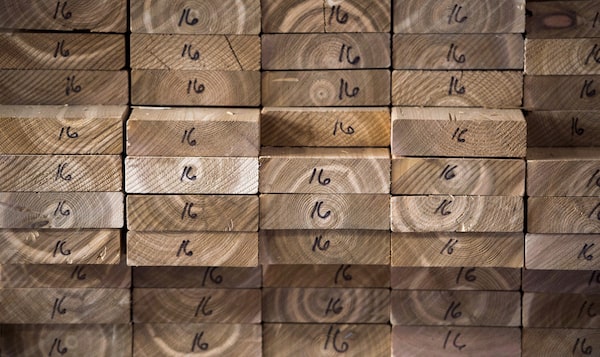
Cedar planks are stacked at a lumber yard in Montreal in 2017.Paul Chiasson/The Canadian Press
Back in the last century, when the weekend print editions of North American newspapers typically weighed as much as a cement block, owning a forest products company was a source of infinite wealth for some of Canada’s richest families.
So much so that, in the 1980s, the Reichmann brothers got into a bidding war to acquire Abitibi-Price and Quebecor founder Pierre Péladeau teamed up with British press baron Robert Maxwell to buy Donohue. Years earlier, Power Corp. of Canada POW-T patriarch Paul Desmarais, who always seemed to be ahead of the pack, had taken control of Consolidated-Bathurst. Good times.
The party ended with the internet age. By the early 2000s, after a wave of consolidation, Abitibi-Price, Consolidated-Bathurst and Donohue had all been rolled into a single entity called AbitibiBowater. Saddled with debt, plummeting newsprint demand and a high Canadian dollar, it filed for bankruptcy protection in 2009.
The restructured company that emerged from the ashes of that debacle, Resolute Forest Products RFP-T, is a shadow of its former self. It produced 1.5 million tonnes of newsprint and other paper grades in 2021, after shuttering mills in Amos, Que., and Baie-Comeau, Que., in 2020. By comparison, AbitibiBowater pumped out nearly six million tonnes of newsprint at its peak.
Now, Montreal-based Resolute, which traces its origins back to the 1820 founding of William Price Co. in Quebec, is set to begin yet another chapter in its long and storied history after Paper Excellence Group last week announced it would acquire the company in a US$2.7-billion deal, a sum that includes Resolute’s unfunded pension liability. The company has almost 7,000 employees, with about 4,000 of them in Quebec.
Toronto-based Fairfax Financial Holdings Ltd., which emerged as Resolute’s largest shareholder after buying convertible debt in AbitibiBowater before its restructuring, will pocket more than US$626-million for its 40-per-cent stake in the company – defying naysayers. Resolute shareholders also stand to earn a share of nearly US$500-million in duties, currently held in escrow, in the event the duties are returned to Resolute under a future Canada-U.S. softwood lumber agreement.
Resolute’s purchase by privately held Paper Excellence, through its wholly-owned Domtar unit (another North American forest products giant with deep Quebec roots that it bought last year), is a testimony to the solid performance of Resolute’s management team, led by chief executive officer Remi Lalonde. The new owner says it intends to keep the team in place once the deal closes in early 2023.
“Because the industry has shrunk so much, all of the inefficient mills have been closed and the remaining ones are pretty efficient,” said Martin Fairbank, a Montreal-based chemist and forest industry consultant who previously spent three decades working at Resolute and has written a book on the company. “And the kraft pulp assets are still pretty valuable because Canadian softwood trees have the best qualities in the world, except for maybe the Scandinavian ones.”
News of the sale has raised hopes that Paper Excellence – which is owned by Jackson Widjaja, scion of the Indonesia-based Asia Pulp & Paper empire – will invest hundreds of millions of dollars to convert Resolute’s Gatineau newsprint mill to make containerboard. The Quebec government, which has subsidized similar conversions at facilities in the province owned by Montreal-based Kruger, is keen to keep remaining mills running.
Resolute, which is set to announce second-quarter financial results on Wednesday, has benefited from its vertically integrated operations. It has vast timber-harvesting rights in Quebec and Ontario, providing its sawmills with a dependable supply of raw material to produce lumber and pulp. Its wood products operations have profited from lofty lumber prices during the COVID-19 pandemic, with the division posting net income of US$772-million in 2021 and US$219-million in the first quarter of 2022, respectively.
Resolute is unique in that it also owns 170 megawatts of hydroelectric generating capacity in Quebec’s Saguenay region, providing its mills with cheap, emissions-free power. The company sold a similar stable of lucrative hydro assets in Ontario to pay down debt in 2009.
The Resolute deal is a reminder that, despite a rocky couple of decades, the Canadian forest products industry remains a major one capable of attracting international investors. At nearly $56-billion, forest products ranked among the country’s top five exports in 2021, generating a trade surplus of more than $25-billion. In comparison, Canada exported about $61-billion worth of motor vehicles and parts in 2021, but the auto sector as a whole posted a trade deficit of $34-billion.
That alone should make the forest products industry worthy of more respect that it gets from domestic investors and policy makers. With the Resolute deal, at least someone is finally noticing.
Your time is valuable. Have the Top Business Headlines newsletter conveniently delivered to your inbox in the morning or evening. Sign up today.
 Konrad Yakabuski
Konrad Yakabuski